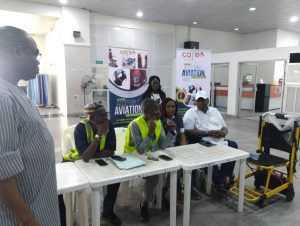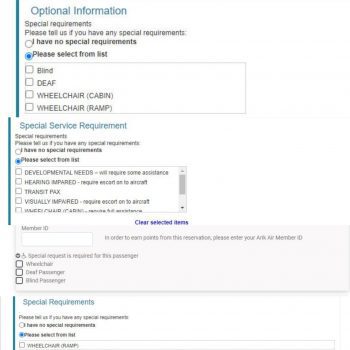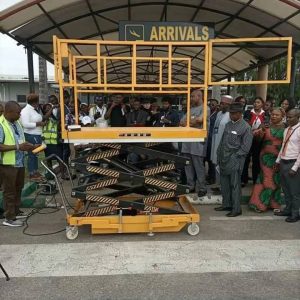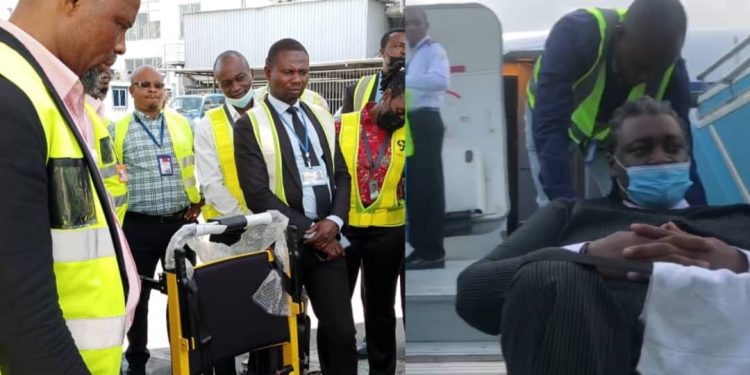Mrs. *Gbemi Oguntoyose was to travel from Lagos to Port Harcourt on Dec 13, 2020. But because she has a physical disability and uses a wheelchair, she was refused boarding on the Dana Air flight 9J 353. Consequent to outcries by other passengers on the flight, Dana Air, which had earlier claimed its policy did not have provision for wheelchair users, eventually boarded Mrs. Oguntoyose.
In a similar scenario, Dr. Chike Okogwu, another physically challenged man was on Dec. 20, 2020, prevented from boarding his Dana Air flight scheduled for 9:05 pm from Abuja to Lagos. It was a similar excuse that the airline does not fly people with disabilities at night. Okogwu, who had booked a business-class ticket, ended up missing the trip. This, expectedly, caused rancour within the airport premises.
Obviously, the experiences of these two Nigerians highlight the challenges that People With Disabilities (PWDs) face when travelling by air, particularly in Nigeria. Apart from the direct refusal to board a PWD on an airplane, PWDs also experience some form of stigmatisation when they present themselves for check-in at the airlines’ counters.
Adebukola Adebayo, a blind man, and a disability-inclusive consultant shared how he dreaded travelling alone without an aide because of his experiences with airline operators.
“In May 2020, I was scheduled to travel with Max Air on a 6.45 pm flight from Kano to Lagos. I didn’t travel until 5.50 am the next morning, with no apology, and no compensation. It might sound like a usual thing for flights to be delayed, but as a blind man travelling alone, I couldn’t help myself to the toilet nor move around, I was in a sitting position all through the night.
“It was even during Ramadan when I’d thought I would get home to break my fast and have Sahur the next morning; but all that could not happen because I was stuck in the airport. I’m certain a person without a disability would not have felt the impact of the delayed flight the same way I did. Airline operators never understood that, not even the Federal Airport Authority of Nigeria, (FAAN),” he recounted.
While advancing reasons for the challenges PWDs face in the airport, Dr. Okogwu, who is the Executive Director, Centre for Ability, Rehabilitation and Empowerment (CARE) blamed ill-preparedness and lack of adequate training among airline operators in the aviation industry, to support the PWDs during boarding and disembarking.
“Disabilities come in various clusters, which means that our challenges are different. The blind have their challenges navigating through the airport, the deaf are even worse because they cannot communicate with most people, and the wheelchair users, though we can talk and see, getting access into the aircraft is extremely difficult. Persons with albinism also have challenges,” Okogwu cited instances.
This executive director noted, as well, that air travel for PWDs is expensive because travelling with an aide would cost an extra fee to purchase a ticket; this action, he said was discriminatory in its own way.
CARE comes up with an Intervention/ Disability Desk at Abuja Airport
Because many PWDs experience different challenges while boarding or departing the airports, CARE Nigeria, in partnership with the FAAN and the Nigerian Civil Aviation Authority (NCAA) set up a disability desk to support PWDs at the local wing of the Nnamdi Azikiwe International Airport, Abuja.
This service desk provides the necessary support that a PWD traveller requires, including, but not limited to a standby sign language interpreter for the deaf, sighted guides for the blind, and ambulift and stair climber that can convey wheelchair users into the aircraft. Support staff are also engaged at the facility to mediate issues that affect PWDs.
Video of PWDs being carried into the aircraft manually and with the wheelchair climber
Similarly, CARE was able to conduct training for airport staff and built partnerships with the FAAN and NCAA. Dr. Okogwu told BONews Service that by engaging with local airline operators in Nigeria and NCAA, airlines had been mandated to collect the disability status of their passengers to enable them to make necessary provisions for such travellers.

“It is mandatory for airlines to know your disability status so they can provide a PWD with handlers who would assist such PWD and our job at the airport is to help support these handlers. So, we are pre-informed about PWD travellers and their disability type and we are readily available to support them with our equipment and staff,” Okogwu added.

Sharing her experience, Mrs. Patience Ogolor, a physically challenged woman, who was travelling in early Sept. 2022 could not be boarded on her Green Africa flight from Abuja to Lagos because the aircraft was too small and narrow to allow her wheelchair to pass through the aisle to her assigned seat.
“At the point of boarding, I was told I would not be boarded because the stair climber wheelchair that CARE uses could take me up to the aircraft but not to my seat. Instead of escalating the issue, I referred to the CARE disability desk and the staff intervened where it was agreed that Green Africa would refund me while I book a flight with another airline with a bigger aircraft,” she said.
Mrs. Ogolor eventually made her trip and she secured her refund from Green Africa. Though there was a little glitch at inception, she was happy eventually and not embarrassed as the case used to be, where PWDs would either resort to fate or public outcry that might not bring immediate solutions.
Relating a similar experience, Dr. Adebayo who travelled from Abuja to Lagos on Aug. 30, 2022 said he was elated when he was received by the CARE service staff before his trip.
“I received a notification that my Arik Air flight had been rescheduled, but when I got to the airport and I found out I’d missed my flight. This was because the screen reader did not pick the accurate time on my ticket. I was initially booked for 4:35 pm, but the flight was rescheduled to 3:25 and thought it was 5:25 pm; the screen reader only picked 5 instead of 15:25 as the times are usually configured,” he said.
Adebayo, who was already worried about his dilemma, was surprised about the warm response of the airline staff who checked him into the next available flight.
“The airline staff had been trained by CARE and they understand the peculiarities that come with our disabilities, and when I lamented about the error from my screen reader, they could easily relate to it,” he explained.
Adebayo further narrated how he was accompanied by two staff members of CARE service – a male and a female, to the boarding hall.
“Usually what was applicable is that after checking in, you would sit at the FAAN customer service desk and after a while, FAAN staff would take you to the boarding hall, while you wait for boarding. They are not concerned if you need anything, even if your flight was delayed for 24 hours.
“With the CARE service staff, I had companionship because both of them stayed with me and I didn’t feel neglected or alone before I boarded. The man was able to accompany me to the restroom when required and also got me food when I needed to eat after the flight was delayed repeatedly due to technical issues,” he recounted.
Adebayo noted that the warm reception was the same when he returned to Abuja as the CARE service staff members are always on the ground to assist PWD travellers.

Applaudable but limited by Location, Funding
Nigeria currently has 27 local airports with at least 18 major. However, the CARE project is only running at the Nnamdi Azikiwe International Airport. This leaves PWD travellers in other airports to continue with the discrimination and challenges.
When enquired on a plan for expansion of the service to other facilities, Okogwu said “this is a work in progress and we are doing what we can do in just Abuja airport.
“In Lagos airport, there are some levels of support but what of other airports in Nigeria? Oftentimes, we are on our own.”
He noted, however, that it is intended that the project is expanded to at least the six geo-political zones of the country to enable PWD travellers to benefit from the initiative.
Also, the CARE service staff are six and would only be able to provide the needed support to few PWDs if there are many PWD travellers in a day. For instance, if three PWDs are travelling with different airlines at the same time, and another three PWDs are arriving in Abuja with different airlines at about the same time, it would be difficult for the support staff to manage all of them efficiently.
Okogwu also noted that the initiative is looking towards expansion before December 2022, such that when there’s an upsurge in travelling, especially during the festive period, PWDs are well catered for.
Finally, the initiative by CARE is a one-year funded project by OXFAM and Voice in Nigeria, which will end in 2023.
Though the project is being implemented in close partnership with FAAN, NCAA, and the National Commission for Persons with Disabilities (NCPWD), it might not continue after the project elapses, especially the component of Service staff.
Appeal for Sustainability
To enhance sustainability for this initiative and to continually break the barriers experienced by PWDs in the aviation sector, CARE Nigeria is seeking more funding support and volunteers for the project. The organization can be contacted via +2348037033337.
Editor’s Note: *Names with asterisks have been changed to protect the victims’ identities.
This story has been made possible by Nigeria Health Watch with support from the Solutions Journalism Network, a nonprofit organization dedicated to rigorous and compelling reporting about responses to social problems.

